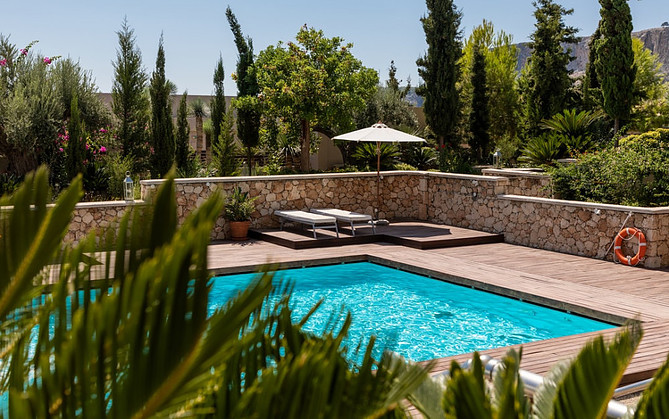An investment property is a property bought with the intention of obtaining further income, gain or wealth from it, be it through rental income or future resale, or both. This definition will be expanded in the next section. But, for now, it’s important to understand the basics to try and think about the possible effects having a pool with your investment property might have on your income. And, Should You Buy an Investment Property with A Swimming Pool?
The possible advantages and disadvantages of buying an investment property with a swimming pool will also be elaborated on in the continuation of the article. Also, here you will find some tips to keep in mind when thinking about buying an investment property with a swimming pool. If that’s something you’re curious about, and from the sole reason you clicked on this article, it might be a topic you’re interested in, continue reading to find out more.
The structure itself will follow the already mentioned topics. First, some basic definitions of an investment – and a swimming pool – will be presented, then some advantages and disadvantages of your investment property having a swimming pool, what kind of value does a swimming pool give to the property, when to leave and in which situations it’s better to demolish it, and finally the round-up of everything in the conclusion: should you buy an investment property with a swimming pool or not.
Let’s start rolling and cover some basics first…
What Is It Meant By Buying An Investment Property?
As mentioned in the introduction, an investment property is a property bought with the intention of earning further income or gain from it, be it through rental income or future resale, or both.
It can be a long-term project or a short-time endeavor in which the investor will turn to ‘flipping’ – renovating the property with the intention of selling it for a higher price.
Even though it’s sometimes referred to as a second home, an investment property isn’t necessarily bought with the intention of it being the primary or secondary residence. As the name suggests, it’s bought solely for the purpose of generating income, which could be by renting it out to be someone’s home.
The term is not to be mixed with a vacation home someone buys in a picturesque landscape to be their second home.
Which then pulls the topic of what types of investment properties there are.
Investment properties are divided into three categories, the main criteria being their use.
1. Residential investment property, or rental homes, are rented out to tenants, and the income is earned when the landlord collects monthly rents.
2. On the other hand, there are commercial investment properties.
Mainly bought by corporations, they buy properties for business purposes and collect lease payments. Even though the upkeep of these properties might be higher than by residential properties, the income is also bigger.
3. And finally, there are mixed-use investment properties that are a combination of the former two types.
The most common example of this type of property is one with a business on the bottom floor and a residence on the top floors.
There are other types of real estate as well, but they are not the mainstream though. More in the below video.
Now let’s turn on to pools, particularly swimming pools.
What Is A Swimming Pool?
The Cambridge dictionary defines
swimming pool as an artificial area of water with the purpose of swimming, or a building containing an indoor or an outdoor swimming pool.
In other words, a swimming pool is a structure designed to hold water to enable swimming or other types of leisure activities. They can be built in-ground or above ground, but more about the different types of swimming pools a little bit later.
Many health and fitness clubs have them, they’re a common sight in spas, but more and more homes have a pool in their backyard nowadays. They, of course, vary in size, the largest being the Olympic pool.
The great bath or Mohenjo-Daro situated in Sindh, modern-day Pakistan, is the earliest documented public water tank, so most likely the first-ever public poor.
Ancient Greeks built pools as a part of their warrior training to improve their physical strength. The Romans later improved these communal pools. As we know already, after Romans come the Dark Ages, unclean and riddled with disease and death. Only in the 20th century, with the crowning of Queen Victoria, six new pools were built in London.
Then, over time, many wealthy families built pools for their own pleasure, which is common even today. For example, nowadays, approximately 1.2 million Australian homes have a swimming pool.
Types of Swimming Pools
After we’ve dealt with the definition and the interesting history of swimming pools, let’s focus on the different types of swimming pools.
The most basic differentiation follows:
- Above-ground pool
This type of pool is a less costly and more portable alternative to the in-ground swimming pool. It’s easier to maintain and it can be taken with when moving homes.
- In-ground pool
This type is the opposite of above-ground pools. This article will be focusing on mainly in-ground pools.
- Indoor pool
It’s located under a roof and is protected by at least three walls.
- Outdoor pool
These basic types are further divided into multiple sub-categories:
- Architectural pool
This type of pool resembles the look of the house and uses the same materials for a cohesive look. It’s modern and often designed by an architect at the same time as the house itself to fit the house layout perfectly.
- Family pool
Just as the name suggests, family pools are pools often built in a backyard of a family home for the sole purpose of having fun.
They’re like a small-scale waterpark, with multiple features should a family wish for them.
- Kiddie pool
For people who can’t afford a family pool, there’s always a kiddie pool. They’ve been around since the 1940s, making them a favourite childhood memory for everyone with even a little space by the home.
- Infinity pool
Also called infinity edge pool, vanishing edge pool, negative edge, zero edge, or disappearing edge pool, is a custom-built pool that, when done right, gives an illusion of a sheet of water dropping off over the edge.
- Lap pool
Often used for fitness, they are usually long and narrow, often longer than 50 feet. Given their length it’s not that practical to build a lap pool within a residential property.
- Natural pool
Or swimming pond in Europe, is a self-cleaning pool that’s a combination of swimming areas and water gardens. The self-cleaning property comes from friendly bacteria attached to the pond.
- Competition pools
Recreation and competition pools fall under the same category, such as the Olympic pool or lap pools. They’re large and spacious pools catering to certain activities.
- Plunge pool
They’re small cold-water pools originating all the way from the ancient Romans and are still used in traditional Chinese medicine.
- Saltwater pool
Popular mainly in Australia and New Zealand, this term doesn’t refer to the design of the pool but rather the type of filter it uses – the saltwater filter.
- Spool
Combining the words sauna and pool, a spool is constructed. It’s a less costly alternative to the large pool areas.
Pros Of Having A Swimming Pool In An Investment Property
From now on, when talking about an investment property with a swimming pool, we’ll be talking about a family pool and not other types such as a kiddie pool.
Since by now both the terms investment property and pool have been defined, it’s time to dive deeper into the advantages and disadvantages of combining them – of investing in a property with a swimming pool.
Here are the advantages of investing in a property that comes with a pool.
- Fitness and healthy lifestyle
A pool offers a great way to maintain that healthy lifestyle everyone wants. Therefore, investing in a property with a swimming pool is a great way to attract certain demographics.
- Stress relief
Connected to the previous advantage, swimming is also a great way to relieve stress. We’re living in a day and age where stress relief is very much needed – so why not have a pool next to your room.
- Luxury
Owning a swimming pool, especially a large, family in-ground pool in the back yard, is a sign of luxury. Once again, it’s a great way of attracting a certain demographic.
- Family
Unlike luxury, pools are a great way for a family to spend some quality time together. It’s relaxing and fun – and it can attract families just as much.
- Summer
Depending on the climate, summers in some parts of the world can get quite hot, so having a pool is an advantage if you’re not situated at the seaside.
- Property value
This topic will be further developed in a separate section, but having swimming pools can add value to the property, at least in most cases.
Cons of Having A Swimming Pool In An Investment Property
Besides all the fun and beneficial aspects of having a swimming pool in an investment property, there are some possible disadvantages to keep in mind. Don’t allow the daydreams of a happy summer afternoon with a family by the pool but consider every aspect rationally.
The below are the challenges and realities of buying a property with a pool.
- Maintenance
A pool needs regular maintenance, which can be done manually, or you can always a person to do that for you. The first is time-consuming, depending on the size of the pool, and the latter can be quite costly.
There are also various tools and automation options that can do some maintenance for you, though they can also be quite expensive and will need their maintenance as well.
- Running costs
Just like maintenance, running pool day-to-day is an investment only the most determined can put up with. There are water bills, electric bills, filters that can quickly add up at the end of the month.
- Safety
There are potential safety issues connected to owning a pool. Some people don’t know how to swim, most importantly children.
Pool owners have a large responsibility of keeping their pool a safe place for everyone.
- Additional insurance
Because of the safety risks, you might need additional insurance in case you get sued for whatever tragic event happens at the pool.
- Pool-related sickness
Ear and respiratory infections, rashes, and diarrhea are illnesses connected to the water and are easily caused by exposure to water contaminated with germs or chemicals, such as swimming pools, water parks, or other public swimming spaces.
- Separate pool inspector when buying
When buying a property with a pool, you’ll need an additional inspector just for the pool. This can not only be quite an inconvenience but also quite costly.
- Wildlife
Mosquitos and other insects are drawn to water, especially in the summer months when they’re at their peak, and we’re also most likely to be using the pool too.
Other water-loving animals can pose a problem as well. For example, raccoons can carry diseases that people can get through the water. Not only is it a nuisance, but it’s also dangerous.
What To Look For When Buying An Investment Property With A Swimming Pool?
If you’ve weighed out both the advantages and disadvantages of owning a property with a pool and are seriously thinking about investing in it, here are some things to keep in mind. This is a large decision and should be executed accordingly.
- Safety
This should be the first point to think about, especially if your property is supposed to be rented out to tenants.
Each state has different safety regulations, so make sure you do proper research before investing into a property with a pool.
- Costs
The bills are higher with a pool. There are maintenance costs that will inevitably fall on the back of the landlord and not the tenants, if your property manager did not word the tenancy agreement right.
Due to the potential safety issues, there’s extra insurance that needs to be paid.
All these costs need to be kept in mind when buying a property with a pool.
- Home value
When debating whether to buy a property with a pool, ask yourself if it adds value to the property or not.
This question will get its own section a little later, as it’s an important aspect to think about regarding investment properties, specifically, the main topic of this article.
- Territory
When you’re buying an investment property, you need to think about whether you’ll be able to rent it out or resell it.
A warm-climate investment property with a swimming pool is more likely to gain you income than a cold-climate property with a swimming pool.
When You Should Leave The Inground Swimming Pool On Your Rental Property – When Does A Pool Add Value?
The question of whether a pool adds value to the property or not has been asked earlier in the article. Now it’s time to answer it, and the answer isn’t as simple.
The general consensus among the experts is no, it does not add value to an average household. However, there are exceptions when having a pool might actually add value to the property.
Here are some of the scenarios.
- Proximity to the beach
This might sound ironic, but people are more likely to want a property with a pool if the property is also close to the beach. Living by the water is appealing to many people, so a pool will add value to properties by the beach.
- Climate
Similarly, having a pool in properties in warmer climates will add value to the property. The warmer the climate, the higher the demand for pools.
- Age and design of the pool
A cheap above-ground pool isn’t very likely to add any value to the property, whereas a modern in-ground pool, albeit more expensive, will add value to the property, if the property targets a high-end luxury market.
- Area
If the property with the pool is in an area with people who want such properties, for example, families with younger children, luxury high-end neibouhoods, the pool will add value to the property.
When You Should Demolish The Pool And Construct?
In the cases opposite from the situations mentioned in the previous section, a pool doesn’t add any value to the property. Right the contrary, it might even decrease it. It will empty your, the investors’, pockets and reduce your rental income.
In that case, it’s better to demolish it. Here’s a list of the possible situations when it’s for the best to get rid of the swimming pool.
- It is no longer used
Be it because the kids have grown up and no longer find satisfaction in the pool or some other reason, if the pool is no longer being used and is just taking up space and money, it’s for the best to demolish it.
- Money
As stated already, owning a pool is expensive. If, for some reason, the costs of maintaining a pool have exceeded your possibilities, perhaps it’s time to demolish it.
- Repairs and remodels
Perhaps the pool is too old and needs constant repairs that, in turn, become a large financial strain. In that case, the pool should most likely be demolished. Hey, you can always build a newer one, right?
- You can’t sell the property because of it
If you allowed your pool to rot away unused and unmaintained and you want to sell your property, it might be hard.
Nobody wants to buy a property with a pool that will need to be repaired. It’s a large cost that not everyone has the means – or the nerves to do. In that case, it might be better to demolish it first and then try to sell the property.
- Space
Perhaps you have a large family pool in your backyard that’s taking up too much space, the valuable space you’d much rather use for something else – a garden perhaps? In this case, demolishing the pool sounds like the best possible solution.
- Water
A pool wastes a lot of water, and in some parts of the world, access to water is a problem. Parts of Australia or California, for example.
Having to completely drain and refill a pool every couple of years is vastly impossible, and it might be better to get rid of the pool altogether.
- Safety issues
Maybe there are small children or people who don’t know how to swim in close proximity to the pool, and you’re in constant worry for their safety. To ease your mind, demolish the pool.
- Most importantly, if you can extend the house, add value to it or build a separate house in the area where the pool located.
By all means, in this case, you should demolish the pool and build on that area. That’s what smart developers do.
Should You Buy An Investment Property With A Swimming Pool?
Finally, let’s sum up everything that’s been said until now and answer the question from the title.
An investment property is a property bought with the intention of earning further income from it. The topic of this article was to find out whether owning a pool, an artificial area of water with the purpose of swimming, would increase or decrease the value of the property.
We’ve presented some advantages of owning a pool, as well as some disadvantages associated with it. Which side you lean into more is your decision to make. In case there are more advantages than disadvantages in your opinion and you’ve decided to invest in a swimming pool for your investment property, there are some tips to pay attention to.
The experts concluded the pool doesn’t generally add any value to an average property, except in cases also presented for that designated section. If it does nothing to the value of the property, or worse, decreases it, it’s time to demolish it. Especially, if you can extend the house, add value to it or build a separate house on the area where the pool is located. That’s what smart developers do!
All in all, whether you want to invest in a property with a pool is your decision to make. Proper research is crucial, and your own opinions on the matter as well.
Pools are a common sight by hotel complexes and spas, so if your investment property is of that type, a pool will be a must. If you intend on renting out a residential property, there are many aspects to consider. In the end, it is a matter of personal decision, but smarter investors always run the numbers before emotions.
Make sure to sleep on it!





